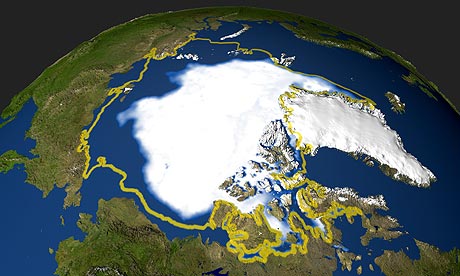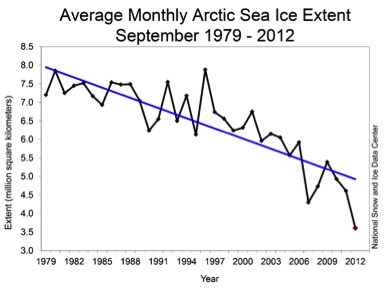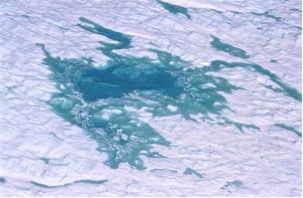
Global warming, Arctic ice loss, and armchair scientists
Posted on 12 August 2013 by John Abraham

As humans put more and more heat-trapping gases into the atmosphere, the Earth's climate changes; we all know that. Some of the trickier questions are, how fast is it changing, what can we expect in the future, what are the costs of slowing emissions (compared to the costs of doing nothing), and what changes are we already observing that give us such confidence in our predictions?
Perhaps the poster child of climate change is in the Arctic, where sea ice has been declining at an astonishing rate. Over the past few decades, satellite information has been gathered which shows huge declines in ice extent (the area covered by ice). The declines are enough that it is possible that in a few years, there will be little or no ice left in the Arctic at the end of the melt season.
If the loss of ice area wasn't bad enough, the volume of ice has decreased faster than the area. By some measures, the volume of ice has decreased approximately 75% over the past 3 decades, since adequate records began to be kept.
For climate nerds like me, internet bookmarks are essential for organizations like the National Snow and Ice Data Center (NSIDC) or IARC-JAXA which provide updated and high-quality information about Arctic conditions.
 Summer Arctic ice extent, National Snow and Ice Data Center.
Summer Arctic ice extent, National Snow and Ice Data Center.
While these institutions gather and make available important Arctic information, a wider community has taken a very active role in interpreting the data. These "armchair" scientists play a particularly important role in telling the rest of us what the data actually means for our future.
Perhaps the best example is the Arctic Sea Ice blog which was started in 2010 by Neven, a 38 year old freelance writer who set up the blog to draw more attention to the Arctic and create a central place for the exchange of information and ideas concerning Arctic sea ice. He also set up the Arctic Sea Ice Graphs website that is a collection of graphs, maps and other pieces of information regarding Arctic sea ice, and he formed a forum to allow community discussion.
Neven, like many other armchair scientists has little formal training. But, he makes up for that with a doggedness that would impress anyone. While he describes his blog as basically weather reports, many publishing researchers turn to him for a comprehensive view of current conditions. Do you want to know what the short term ice conditions will likely be? Ask Neven. Interested in learning about impacts of current conditions on the atmosphere? Ask Neven.
Not only is he a great resource, but the commenters provide insightful thoughts as well. And very often, they are not in agreement with each other. It is refreshing to see people engage in polite yet candid discussions of various views of our Arctic.

Ice sheet melt pond – John Maurer NSIDC
So, what is the view of the current Arctic conditions? Well, let's hear from Neven himself.
"So far the 2013 melting season hasn't been as spectacular as 2012 because of a slow start to the melting season, where a persistent cyclone kept the Arctic cold and cloudy for several weeks in a row. Right now, it doesn't look like the 2012 records will be broken, but there are a few known unknowns out there that might change all that. For instance, a large patch of low concentration ice near the North Pole.
Either way, we're going to learn something from this melting season, like how important a fast/slow start to the melting season can be in this new regime where most of the ice pack consists of thin first-year ice. The weather used to be the dominant factor in determining how low the minimum would turn out. It still is dominant, but the thinning of the ice pack has reduced its importance. In other words, ice thickness decides how dominant the weather can be.
If it turns out that a slow start to the melting season results in a recovery of sorts, and we have a couple of those in a row (which I think is highly unlikely), we could return to the pre-2007 situation. But just one bad year would probably throw the ice pack back to where we are now: a state where a fast start to the melting season, and prevailing conditions that are conducive to melt lead to a virtually ice-free Arctic in September.
I personally believe this could happen before the decade is out, but it still depends on the circumstances. We haven't reached the stage yet where an ice-free September is a done deal. Things rarely are certain in the Arctic. There even could be some unforeseen negative feedback kicking in and (finally) slowing things down, but that's not something I would bet the farm on.
What's important to remember, is that even if not ice-free, the situation is already very, very bad, and it's not unreasonable to think that we have started to experience the consequences of the loss of Arctic sea ice so far. Organizations like Greenpeace tell us that we need to save the Arctic. And even though the Arctic is the most important place in the world right now (IMO), it's not about saving the Arctic, it's about saving ourselves."































 Arguments
Arguments






























"the volume of ice has decreased approximately 75% over the past 3 decades."
Can this be true? The link shows the sea ice anamoly and trend, but I do not know how to calculate the percentage change in volume from the information on the graph. I was expecting to see some beginning and ending actual volumes, say, 100 units of ice declining to 25 units over the 30 years. Could you please explain the loss in volume more fully?
Geoff Hughes
Wipneus PIOMAS
Volume data with various best-fit curves.
Geoff,
http://psc.apl.washington.edu/wordpress/research/projects/arctic-sea-ice-volume-anomaly/
The figures quoted here and in the article represent the volume of ice loss for Septembers (when Arctic sea ice is at minimum extent/area/volume) since 1979.
In case it isn't obvious, I'd just like to point out that the albedo flip feedback is not limited to sea ice. I've read that the extent and/or duration of snow cover on land is also decreasing, and that also creates an albedo flip.
Thanks, everybody.
While concentration is not volume, it becomes an indicator of volume when looked at in the middle of September. I often use the following two images to stun people into awareness. I have them open up each in its own tab.
September 15, 1979
September 15, 2012
Nice to see some well-deserved recognition for Neven's efforts. He runs a great blog.
DSL @ 7
Any chance of getting those two ice concentration images put into one of those clever graphics that flips between the two conditions - in the same way the 'escalator' one does? It does rather spell out just how much the Arctic is changing.
funglestrumpet @ 9
All the images are at arctic.atmos.uiuc.edu/cryosphere/archive.html
A video expert could, with a bit of time, put the entire dataset into a movie.
CT has done that, but it's only up to 2006 (with a few more yearly anims for the 2000s). They also have a comparator. I like the tab flip, though, because it's a little more dramatic.
Need to shoot them an email for the updated anim.
Especially for the "armchair" scientists, Coursera is offering a new course on climate change offered by the University of Melbourn. You can go to Coursera.com to enroll.
It is interesting to note the "sea change" beginning to be noted in local papers, and at cocktail partys. Much less "denying" of the facts: the most dominent response to the rising reality is "Oh well, I'll be dead and gone, WTFrack..."
So now begins the penetration of the psyche of the reality that life on this planet is threatened: at the very least, "civilization" is at risk.
Not an easy transition to accept, everyone lives here.
davidnewell - (-SNIP-)
[DB] Repetitive sloganeering snipped.
Deep, AJ, deep. Poverty's never killed anyone either. Neither has, IIRC, any president of the US.
The drop in ASI can change global weather patterns (hard to avoid doing that), and the resulting changes have undoubtedly led to specific deaths that wouldn't have occurred otherwise. Perhaps you should be more specific, AJ. Are you actually suggesting that changes to general circulation have no impacts on human life?
I would note that ajkuiper has not responded to requests to support some sloganeering here. I hope he/she is more ready to engage with some actual science in this discussion.
"Neither has, IIRC, any president of the US. "
Andrew Jackson is known to have killed opponents in duels.
Thank you, Philippe. I knew there was a name for that lightless spot in my memory.